
|
|
THE INTERNET ENCYCLOPAEDIA OF
PERSONAL CONSTRUCT PSYCHOLOGY |
 |
| Main Page |
| Contents |
| Alphabetical Index |
| Hints for prints |
| |
| Impressum |
| Giambattista Vico |
|
 Neapolitan philosopher (1668-1744), considered
the first precursor of radical constructivism. His dictum "verum ipsum
factum"1 (the truth is
the same as the made) points in the direction of knowledge
construction more than half a century before Kant. The only way of
"knowing" a thing is to have made it, for only then do we know what its
components are
and how they were put together. Neapolitan philosopher (1668-1744), considered
the first precursor of radical constructivism. His dictum "verum ipsum
factum"1 (the truth is
the same as the made) points in the direction of knowledge
construction more than half a century before Kant. The only way of
"knowing" a thing is to have made it, for only then do we know what its
components are
and how they were put together.According to von Glasersfeld, Vico's "knowledge" is what, today, we might call an awareness of the operations that result in our experiential world, thus preempting the term "operation" launched by constructivists such as Dewey, Bridgman and Ceccato in our century. Furthermore, his idea of the active construction of all knowledge and experience come very much closer to Piaget's genetic epistemology and to modern constructivism in general, as is particularly clear in the statement "Human knowledge is nothing else but the endeavor to make things correspond to one another in shapely proportion". 1Giambattista Vico (1710). De antiquissima Italorum sapientia. Naples: Stamperia de' Classici Latini, 1858. |
|
| References |
|
|
|
|
Gabriele Chiari & M. Laura Nuzzo
|
|
|